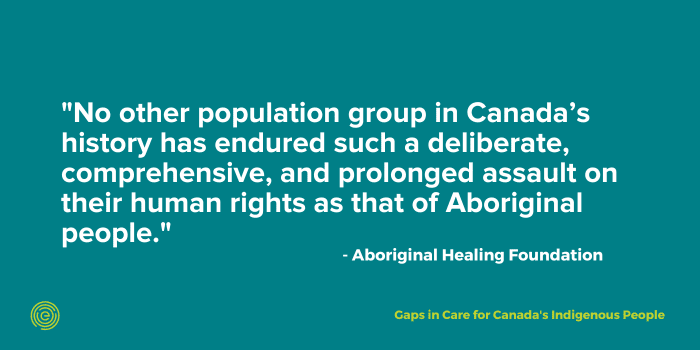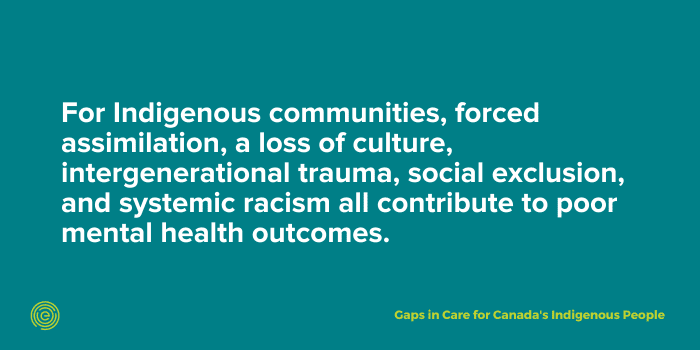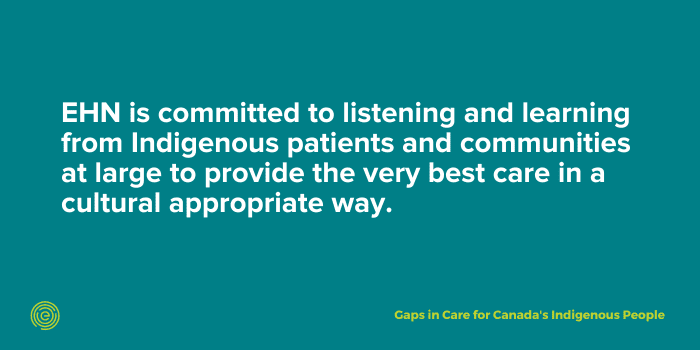June is Indigenous History Month in Canada, and it’s an important time to recognize the history, heritage and diversity of First Nations, Inuit, and Métis peoples. It goes without saying that, beginning with colonization, Indigenous people have suffered systemic oppression, abuse, and enslavement at the hands of non-Indigenous people, particularly within the residential school system.
Because Indigenous communities in Canada are so diverse, and the totality of their marginalization so broad, it is impossible to address everything that needs to be addressed in one blog. But, considering the historic stigma and mistreatment this community has suffered at the hands of the healthcare system, EHN has a critical role to play in addressing the widespread health disparities among Indigenous people in treatment.

A 2020 study published in the Canadian Journal of Public Health links discrimination in healthcare settings to disparities in healthcare access among Indigenous people living in urban centres, pointing out that “critical gaps remain in our understanding of Indigenous health in Canada.” In short, neglect, abuse, lack of cultural understanding, and/or discrimination from healthcare practitioners mean the medical needs of some Indigenous people will unfortunately not be met.
What is the Truth and Reconciliation Commission and its implications for Indigenous health?
Prioritizing Indigenous mental health in Canada as a whole is not only the ethical thing to do but is also part of specific calls to action outlined in the Truth and Reconciliation Commission.
Compiled from 2007 to 2015 as an element of the Indian Residential Schools Settlement Agreement, the Commission Final Report identifies 94 calls to action for the Canadian government.
Here are some calls to action in terms of health:
- “We call upon the federal, provincial, territorial, and Aboriginal governments to acknowledge that the current state of Aboriginal health in Canada is a direct result of previous Canadian government policies, including residential schools, and to recognize and implement the health-care rights of Aboriginal people […].”
- “In order to address the jurisdictional disputes concerning Aboriginal people who do not reside on reserves, we call upon the federal government to recognize, respect, and address the distinct health needs of the Métis, Inuit, and off-reserve Aboriginal peoples.”
- “We call upon the federal government to provide sustainable funding for existing and new Aboriginal healing centres to address the physical, mental, emotional, and spiritual harms caused by residential schools, and to ensure that the funding of healing centres in Nunavut and the Northwest Territories is a priority.”
The Yellowhead Institute, a First Nation-led research centre based in the Faculty of Arts at X* University in Toronto, has been tracking the status of the Canadian government’s Truth and Reconciliation promises. According to their Dec. 2020 report, Canada had only completed eight of the 94 calls to action at the time of publishing.
How does intersectionality affect Indigenous health outcomes?
Recognizing intersectionality in Indigenous health care — the way race, gender, disability, and other characteristics create overlapping systems of oppression — is also important to consider throughout the therapeutic process. For example, Aboriginal Two-Spirit and LGBTQ+ people can be subjected to structural oppression including, homophobia, heterosexism, and racism.

A research project commissioned by the Aboriginal Healing Foundation found that the most common mental health diagnoses in Indigenous communities in Canada were post-traumatic stress disorder, substance abuse disorder, and major depression. Alcohol abuse in Indigenous communities dates back to the introduction of liquor by European fur traders in the early seventeenth century.
“No other population group in Canada’s history has endured such a deliberate, comprehensive, and prolonged assault on their human rights as that of Aboriginal people,” the Foundation says in the project. “Yet, despite growing recognition of past wrongs, many Canadians remain unaware of the full scope of these injustices or their impacts.”
What is culturally competent care and why does it matter?
Zooming out slightly, we know that Western healthcare systems generally do not cater to minority groups. Forced assimilation, a loss of culture, social exclusion, systemic racism, and intergenerational trauma among indigenous people, all contribute to poor mental health outcomes for this community.
According to the American Healthcare Association’s definition, “cultural competency in health care describes the ability of systems to provide care to patients with diverse values, beliefs, and behaviours, including the tailoring of health care delivery to meet patients’ social, cultural, and linguistic needs.”
For mental health care practitioners, this means listening to the wants and needs of Indigenous people when it comes to involving spiritual or traditional practices in their care. We cannot force a Westernized approach onto every patient at our facilities, and care must be trauma-informed.
This year on Indigenous People’s Day (June 21), The Canadian Mental Health Association urged the government and the health sector to advance its commitments to reconciliation. This includes consulting with Indigenous communities to identify and close gaps in mental health outcomes:
- Providing substantial funding for Indigenous healing centres to address the physical, mental, emotional, and spiritual harms caused by residential schools
- Increasing the number of Indigenous professionals working in the healthcare field
- Providing cultural competency training for all healthcare professionals
For example, the traditional “12-Step” addiction recovery model includes aspects of Christianity. Considering the fact that residential schools were a collaboration between the Catholic church and the Canadian government, it is understandable that not all Indigenous people would connect with the program.
As well, in-patient facilities run by predominantly white or non-Indigenous staff can serve as a painful reminder of the residential school system. It’s another reason Indigenous patients can walk into these facilities already carrying distrust and fear.

EHN is committed to listening and learning from Indigenous patients and communities at large to provide the very best care in a cultural appropriate way, both organizationally and as individuals. At our Edgewood facility in British Columbia, for example, we offer a safe space for Indigenous clients to practice traditions that are important to them, including smudging. As well, an elder from the local Snuneymuxw First Nation visits regularly to spend time with patients and educate the staff in cultural awareness. And throughout EHN, staff undergo cultural competency training.
At a time when First Nations are still in mourning following the horrific discovery of almost 1,000 unmarked graves in Kamloops, B.C., and Saskatoon, A.B., they need our help more than ever. It is crucial that all Canadians commit to education and activism for the mental and physical wellbeing of all Indigenous people who’s land we occupy.
More reading
- The Canadian Encyclopedia: Indigenous Peoples, Residential Schools in Canada
- Calls to Action Accountability: A 2020 Status Update on Reconciliation Executive Summary
- Land Back: A Yellowhead Institute Red Paper
- What is reconciliation?
- Pulling Together: Foundations Guide
Sources
Aboriginal Healing Foundation, & Chansonneuve, D. (2007). Addictive Behaviours Among Aboriginal People in Canada. Aboriginal Healing Foundation. https://www.ahf.ca/downloads/addictive-behaviours.pdf
CMAJ (Canadian Medical Association Journal). (2013, January). Considering culture in Aboriginal care. https://doi.org/10.1503/cmaj.109-4376
Kitching, G. T. (2019, August 21). Unmet health needs and discrimination by healthcare providers among an Indigenous population in Toronto, Canada. Canadian Journal of Public Health. https://link.springer.com/article/10.17269/s41997-019-00242-z?error=cookies_not_supported&code=9795722b-26c8-4662-b4c5-9bacab680e7e#ref-CR18
Numata, Y. (2020, December 21). Calls to Action Accountability: A 2020 Status Update on Reconciliation. Yellowhead Institute. https://yellowheadinstitute.org/trc/
Rainbow Health Ontario, & Ristock Et Al., Women’s And Gender Studies Program, Faculty Of Arts, University Of Manitoba, J. (2010, December). Aboriginal Two-Spirit and LGBTQ Migration, Mobility and Health Research Project: Winnipeg Final Report, November 2010. Rainbow Health Ontario. https://www.rainbowhealthontario.ca//www/wp-content/uploads/2010/12/Two-Spirit-Migration.pdf
Residential Schools in Canada. (2012, October). The Canadian Encyclopedia. https://www.thecanadianencyclopedia.ca/en/article/residential-schools




